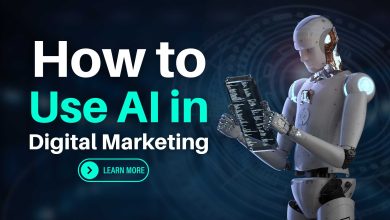Digital Marketing Evolution: Embracing the Era of Web 4.0
Digital marketing has undergone remarkable transformations over the years, from basic websites to dynamic social media campaigns and personalized advertisements. As we step into the future, the rapid advancement of technology and the increasing reliance on the Internet are paving the way for Web 4.0, a new era of digital marketing. Web 4.0 promises to revolutionize how businesses interact with customers, leveraging cutting-edge technologies such as artificial intelligence (AI), the Internet of Things (IoT), augmented reality (AR), and more. In this essay, we will delve into the concept of Web 4.0 and explore how it will reshape the landscape of digital marketing in the coming years.
Understanding Web 4.0:
A. Evolution of the Internet: A brief overview of the transition from Web 1.0 (static websites) to Web 2.0 (user-generated content and social media) to Web 3.0 (semantic web and data-driven experiences).
B. Defining Web 4.0: Introducing the concept of Web 4.0, which emphasizes AI-driven interactions, seamless connectivity, and a personalized user experience.
C. Key Technologies of Web 4.0: Exploring the role of AI, IoT, AR, virtual reality (VR), blockchain, and other emerging technologies in shaping the future of the Internet.
The Impact of Web 4.0 on Digital Marketing:
A. Hyper-Personalization: Analyzing how AI and big data will enable businesses to deliver personalized content, products, and services to individual consumers.
B. Contextual Marketing: Discussing the importance of context-aware marketing, where brands deliver tailored messages based on users’ real-time behavior and preferences.
C. Immersive Experiences: Exploring how AR and VR will create interactive and immersive marketing campaigns, elevating brand engagement to new heights.
D. Voice and Visual Search: Investigating the rise of voice search and visual search as game-changers in SEO and how brands can optimize for these technologies.
E. The Internet of Things (IoT) in Marketing: Unveiling how IoT will connect smart devices, offering data-rich opportunities for marketers to understand consumer behavior.
F. Blockchain for Transparency and Trust: Analyzing how blockchain technology will enhance data security, ad tracking, and transparency in digital advertising.
Also Read…. The Evolution of the Web: Exploring Web 2.0 vs Web 3.0 vs Web 4.0
Web 4.0 Marketing Strategies:
A. AI-Driven Chatbots and Virtual Assistants: Exploring the role of AI-powered chatbots and virtual assistants in providing real-time customer support and personalized recommendations.
B. Augmented Reality Marketing Campaigns: Examining successful AR marketing campaigns and how brands can leverage AR technology to create engaging and interactive experiences.
C. Personalization at Scale: Discussing the challenges and opportunities of delivering hyper-personalized content to a global audience.
D. Data-Driven Decision Making: Emphasizing the significance of data analytics and insights in shaping marketing strategies and identifying customer trends.
E. Customer Journey Mapping in Web 4.0: Understanding how businesses can optimize the customer journey through seamless integration across various digital touchpoints.
F. Ethical Considerations: Addressing the ethical implications of Web 4.0 marketing, such as data privacy, algorithm biases, and the responsible use of AI.
Web 4.0 and Social Media Marketing:
A. Social Media Integration: Exploring how Web 4.0 will transform social media platforms into immersive brand experiences, blurring the lines between content and commerce.
B. Influencer Marketing in Web 4.0: Analyzing the evolving role of influencers and the impact of AI-generated influencers in digital marketing campaigns.
C. Social Commerce and AR Shopping: Investigating the rise of social commerce and how AR shopping experiences will reshape e-commerce.
Challenges and Roadblocks:
A. Data Privacy and Security: Discussing the growing concerns surrounding data privacy and the need for robust security measures in Web 4.0 marketing.
B. Skill Gaps and Training: Addressing the challenges of upskilling the workforce to adapt to new technologies and navigate the complexities of Web 4.0 marketing.
C. Digital Inclusion: Examining the issue of digital inequality and the importance of ensuring that Web 4.0 benefits reach all sections of society.
Also Read…. The Evolution of the Web: Exploring Web 2.0 vs Web 3.0 vs Web 4.0
Embracing the Web 4.0 Future:
A. Adaptive Marketing Strategies: Emphasizing the need for marketers to be agile and adaptive in embracing Web 4.0 technologies and trends.
B. Collaboration and Partnerships: Discussing the role of collaborations between brands, agencies, and tech companies to leverage Web 4.0 opportunities effectively.
C. User-Centric Approach: Reinforcing the importance of putting the customer at the center of marketing strategies in the Web 4.0 era.
D. Responsible AI and Ethical Marketing: Advocating for responsible AI usage and ethical marketing practices to build trust with consumers.
Case Studies of Web 4.0 Marketing Success:
A. Innovative Marketing Campaigns: Analyzing successful examples of brands that have embraced Web 4.0 technologies to drive engagement and conversions.
B. AI-Powered Personalization: Showcasing how brands have leveraged AI-driven personalization to boost customer loyalty and retention.
C. AR and VR Experiences: Highlighting companies that have implemented AR and VR marketing to create memorable brand experiences.
Conclusion:
Web 4.0 promises to reshape digital marketing by offering personalized, immersive, and connected experiences to consumers. As businesses navigate the ever-evolving landscape of digital marketing, it is crucial to embrace the potential of Web 4.0 technologies while addressing the challenges of data privacy, skills gaps, and digital inclusion. By adopting user-centric, ethical marketing strategies and staying agile in an AI-driven world, brands can harness the power of Web 4.0 to create meaningful connections with their audience and thrive in the digital age.
Also Read…. The Evolution of the Web: Exploring Web 2.0 vs Web 3.0 vs Web 4.0



